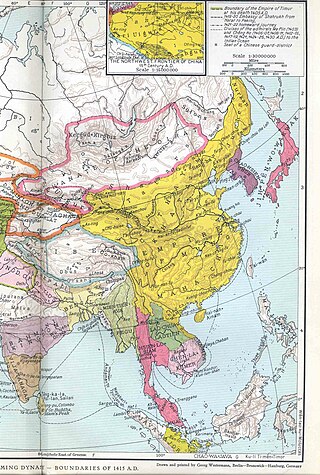
The Ming dynasty, officially the Great Ming, was an imperial dynasty of China, ruling from 1368 to 1644 following the collapse of the Mongol-led Yuan dynasty. The Ming dynasty was the last imperial dynasty of China ruled by the Han people, the majority ethnic group in China. Although the primary capital of Beijing fell in 1644 to a rebellion led by Li Zicheng, numerous rump regimes ruled by remnants of the Ming imperial family—collectively called the Southern Ming—survived until 1662.
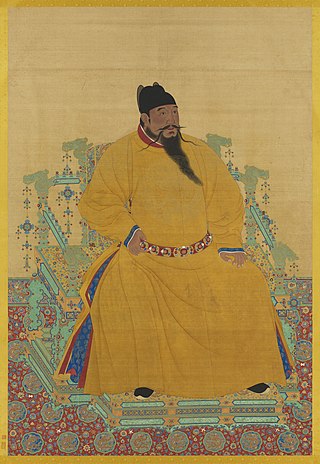
The Yongle Emperor, personal name Zhu Di, was the third emperor of the Ming dynasty, reigning from 1402 to 1424.

Hongwu Emperor, also known by his temple name as the Emperor Taizu of Ming (明太祖), personal name Zhu Yuanzhang, courtesy name Guorui, was the founding emperor of the Ming dynasty, reigning from 1368 to 1398.

Yao Ming is a Chinese basketball executive and former professional player. He played for the Shanghai Sharks of the Chinese Basketball Association (CBA) and the Houston Rockets of the National Basketball Association (NBA). Yao was selected to start for the Western Conference in the NBA All-Star Game eight times, and was named to the All-NBA Team five times. During his final season, he was the tallest active player in the NBA, at 7 feet 6 inches (2.29 m).

Li Zicheng, born Li Hongji, also known by his nickname, the Dashing King, was a Chinese peasant rebel leader who helped overthrow the Ming dynasty in April 1644 and ruled over northern China briefly as the Yongchang Emperor of the short-lived Shun dynasty before his death a year later.
Wu Cheng'en (traditional Chinese: 吳承恩; simplified Chinese: 吴承恩; pinyin: Wú Chéng'ēn; Wade–Giles: Wu2 Ch‘êng2-ên1; Jyutping: Ng4 Sing4 Jan1, c. 1500–1582 or 1505–1580), courtesy name Ruzhong (汝忠), was a Chinese novelist, poet, and politician during the Ming dynasty. He is considered by many to be the author of Journey to the West, one of the Classic Chinese Novels.

The Wanli Emperor, also known by his temple name as the Emperor Shenzong of Ming (明神宗), personal name Zhu Yijun (朱翊鈞), art name Yuzhai (禹齋), was the 13th emperor of the Ming dynasty, reigned from 1572 to 1620. He succeeded his father, the Longqing Emperor. His reign of 48 years was the longest among all the Ming dynasty emperors. "Wanli", the era name of his reign, means "ten thousand calendars".
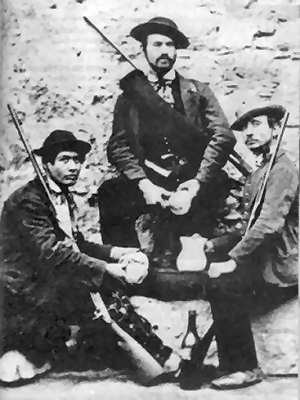
Banditry is a type of organized crime committed by outlaws typically involving the threat or use of violence. A person who engages in banditry is known as a bandit and primarily commits crimes such as extortion, robbery, and murder, either as an individual or in groups. Banditry is a vague concept of criminality and in modern usage can be synonymous for gangsterism, brigandage, marauding, terrorism, piracy and thievery.

Ming the Merciless is a fictional character who first appeared in the Flash Gordon comic strip in 1934. He has since been the main villain of the strip and its related movie serials, television series and film adaptation. Ming is depicted as a ruthless tyrant who rules the planet Mongo.

A cook is a professional individual who prepares items for consumption in the food industry, especially in settings such as restaurants. A cook is sometimes referred to as a chef, although in the culinary world, the terms are not interchangeable. Cooks' responsibilities include preparing food, managing food stations, cleaning the kitchen, and helping the chefs. Restaurants will give a title to the cooks according to their designated stations. Examples are broiler cooks, fry cooks, pantry cooks, and sauce cooks.
Ray Huang was a Chinese-American historian and philosopher who was an officer in the National Revolutionary Army and fought in the Burma Campaign. In 1964, Huang earned a Ph.D. in history from the University of Michigan. He worked with Joseph Needham and was a contributor to Needham's Science and Civilisation in China. Huang taught history at universities in the US and the UK, and he is best known in his later years for the idea of macro-history.

Astronomy in China has a long history stretching from the Shang dynasty, being refined over a period of more than 3,000 years. The ancient Chinese people have identified stars from 1300 BCE, as Chinese star names later categorized in the twenty-eight mansions have been found on oracle bones unearthed at Anyang, dating back to the mid-Shang dynasty. The core of the "mansion" system also took shape around this period, by the time of King Wu Ding.

Huang Zongxi, courtesy name Taichong (太冲), was a Chinese naturalist, political theorist, philosopher, and soldier during the latter part of the Ming dynasty into the early part of the Qing.
Zheng Zhilong, Marquis of Tong'an, baptismal name Nicholas Iquan Gaspard, was a Fujianese (Hokkien) admiral, pirate leader, merchant, translator, military general, and politician of the late Ming dynasty who later defected to the Manchu Qing. He was the founder of the Zheng Dynasty, the father of Koxinga, the founder of the pro-Ming Kingdom of Tungning in Taiwan, and as such an ancestor of the House of Koxinga.

The Great Wall of China is a series of fortifications that were built across the historical northern borders of ancient Chinese states and Imperial China as protection against various nomadic groups from the Eurasian Steppe. Several walls were built from as early as the 7th century BC, with selective stretches later joined by Qin Shi Huang (220–206 BC), the first emperor of China. Little of the Qin wall remains. Later on, many successive dynasties built and maintained multiple stretches of border walls. The best-known sections of the wall were built by the Ming dynasty (1368–1644).

Tyrone Deon Mings is an English professional footballer who plays as a centre-back for Premier League club Aston Villa and the England national team.
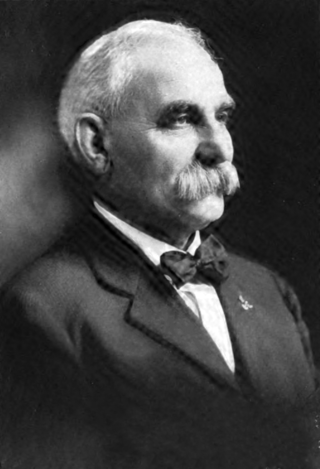
Frederick R. Ming (1865-1943) was a Republican politician from Michigan who served in both houses of the Michigan Legislature, including as Speaker of the House during the 55th and 56th Legislatures. Ming was also a candidate in the primary for Lieutenant Governor of Michigan in 1934, losing to Thomas Read who was eventually elected with Governor Frank Fitzgerald.
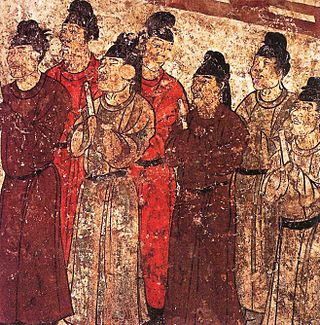
A eunuch is a man who has been castrated. Throughout history, castration often served a specific social function. In China, castration included removal of the penis as well as the testicles. Both organs were cut off with a knife at the same time.

The Jurchen unification were a series of events in the late 16th and early 17th centuries that led to the unification of the Jurchen tribes under the Jianzhou Jurchen leader Nurhaci. While Nurhaci was originally a vassal of the Ming dynasty who considered himself a local representative of imperial Ming power, he also had a somewhat antagonistic relationship with the Ming due to Ming's involvement in events early on in his life that led to the death of his father and grandfather combined with his own increasing ambition.

The Great Plague in the late Ming dynasty, also known as the North China Plague in the late Ming dynasty, or the Great Plague of Jingshi, was a major plague epidemic between 1633 and 1644, the last phase of the Ming dynasty in China, during the Chongzhen Emperor's reign (1627–1644). The epidemic started in Shanxi in 1633 and reached Beijing in 1641, where the plague caused the deaths of more than 200,000 people in 1643, directly contributing to the collapse of the Ming dynasty in 1644.

















